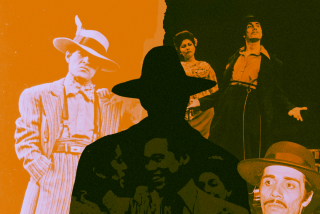Multiculturalism Gets Whacked By Popular Culture
- Share via
One of my students recently brought to my attention three television advertisements that have the dubious distinction of having earned “The Rudyard Kipling Prize for the Year’s Most Racist TV Spot.” The prize is awarded by New York University’s Department of Culture and Communication in its annual takeoff on the ad industry’s Clio Awards.
The winning ads are all part of a campaign by Fox Sports that makes fun of “foreign” customs to attract viewers to the Fox network. One ad, which is set in India, features two blindfolded “contestants” who swing bats at each other and end up attacking their robed and turbaned spectators as an excited “sports announcer” babbles in some unidentifiable language.
Another features a Turkish diving competition in which a contestant is judged on his dive from a high cliff straight into a bare patch of dirt.
And the third is a mock broadcast of some sort of Russian face-slapping contest.
These ads, of course, are supposed to be funny in the way that Polish jokes are supposed to be funny. And making fun of others is hardly anything new in the annals of human behavior.
But what is striking about the Fox Sports ads is that their unabashed appeal to feelings of cultural superiority is made to a generation of youthful Americans who are the first generation to have been raised in an era of multicultural education. If such an audience is indeed persuaded by Fox TV’s zenophobic humor to watch Fox Sports broadcasts, then something has gone badly wrong.
And I think it has. Multicultural education, a movement that is now well over a decade old, is intended to foster respect for and interest in other cultures. Its purpose is to show that America’s traditional culture, which is European at base with a strong Anglo-Saxon top-spin, is but one culture among many with no inherent superiority.
At its best, multicultural education encourages a curiosity in the workings of any culture while discouraging hierarchical cultural partisanship.
But if the advertising team for Fox Sports is right--and ad campaigns are not created out of marketing vacuums--some of today’s youth market is eager for cultural targets to sneer at. And the popular cultural evidence suggests that Fox is right. Just listen sometime, if you can, to contemporary rap lyrics: Whether the targeted group is women, homosexuals, Asians or Jews, youth music is filled with fury against people that the rap audience should have been taught to accept, not revile.
So what has gone wrong? Fundamentally, I think that multicultural education has failed in two ways. First, it seems that telling kids not to hate someone is like telling them not to smoke: It only encourages the proscribed behavior. Popular culture figures from Andrew Dice Clay and Howard Stern to Eminem have all found that there is money to be made by breaking the taboos that adults impose upon kids.
It would appear that a decade and more of multicultural lessons is producing a backlash of resentment and counter-provocation rather than social tolerance.
I also think that there is a second facet to the problem. Generally, the people one finds targeted in popular culture are those perceived to be weak enough to safely attack. Certainly the Indians, Turks and Russians in the Fox ads are in no position to protest and put a halt to the ad campaigns that make fun of them. But women, homosexuals and Jews, who are far and away the most common objects of the anti-multicultural backlash, evidently are perceived as being too weak to fight back as well.
What I fear multiculturalism has created, then, has been an unintentional redistribution of power. Some kids seem to be getting the idea that certain groups, once the target of discrimination, are now off limits, while others are not. I think that this is the result, in part, of schools isolating specific groups for monthlong celebration, while neglecting others. The kids get the message: The celebrated groups have power; the uncelebrated ones don’t. And so, for some, they’re fair game.
What kids should be learning is that it’s wrong either to hate or elevate anyone simply on the basis of their ethnic identity, that multiculturalism means valuing everyone.
That, of course, is what multiculturalism does mean, and I’m neither advocating an end to multicultural education nor claiming that it is solely at fault for the problem. But if the signals we are getting from Fox Sports and pop music are right, kids are getting the wrong message.
More to Read
The biggest entertainment stories
Get our big stories about Hollywood, film, television, music, arts, culture and more right in your inbox as soon as they publish.
You may occasionally receive promotional content from the Los Angeles Times.










